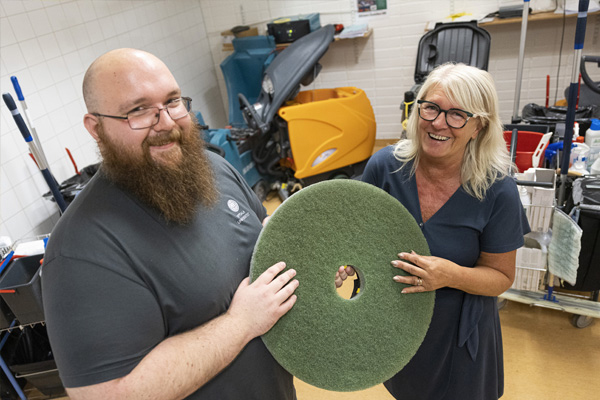Uppsala University is one of the few higher education institutions in Sweden that has Nordic Swan Ecolabel-certified cleaning. As much as 95 per cent of the consumable products used in the cleaning are eco-labelled.
"We have reduced our use of chemicals to almost nothing", says Gun Ekman who is head of the Cleaning Unit at the Buildings Division.
Thanks to scrubbing machines that just use water to clean, we have succeeded in reducing the use of detergents. The machines use so-called diamond pads for scrubbing that both clean and polish at the same time. This means less work for the staff at the same as the floors are left clean without leaving chemical residues. Gun Ekman emphasises that the water-based cleaning brings not only environmental benefits, but also economic benefits.
"Why should we waste money buying chemicals when we can make everything clean and fresh just using water?"
Where detergents are needed, such as to clean toilets, care is taken not to use too much. In most cases, minimal amounts are needed, and a pipette is used to ensure the correct dosage.
No more waste bins
Plastic bag use has also been reduced in order to make the cleaning more environmentally friendly. Blåsenhus was the first with the trial to replace all waste bins with eco-stations – an experiment that worked so well that similar solutions have now been set up in almost all campuses.
Some argue that having no waste bins leads to employees piling up waste next to their desks, and then just throwing it all away as combustible waste. What do you think about that?
"It's a shame. You can take the rubbish with you and sort it when you go for coffee or lunch.
However, Gun Ekman believes that both staff and students have behaved quite well. She also believe that the amount of waste has been drastically reduced since the waste bins were replaced by eco-stations.
"After we removed the waste bins from the classrooms at Blåsenhus, we noticed that there were no longer a lot of coffee cups left on the floor. The students took them with them instead of leaving them behind.
Paper bags must replace plastic bags
Uppsala Municipality has introduced a directive stating that, from October 2022, food waste must be disposed of in paper bags. Even if this requirement does reduce the use of plastic, it isn't exactly easy to implement. Gun Ekman describes how that the paper bags that are available don't really fit in the eco-stations that have been set up. In addition, they're a little more difficult to handle.
"Plastic bags are easy to tie together, but paper bags have to be folded, which means you need to use your hands in a different way."
The cleaning trolleys aren't adapted for the paper bags either, which means the bags of food waste have to be transported in plastic sacks.
"There's a risk that someone will spot us doing this. But we'll only use the plastic sacks to transport the food waste to the waste disposal room."
